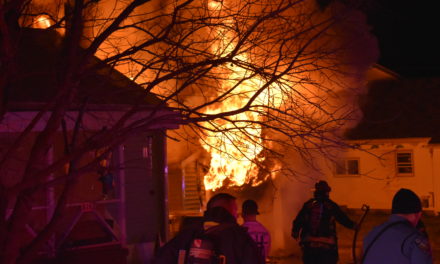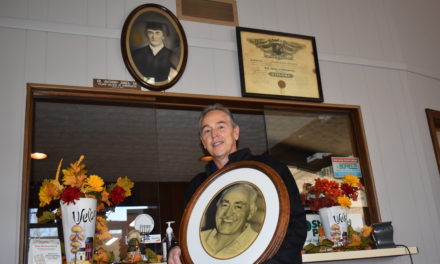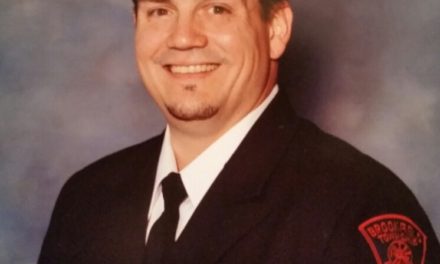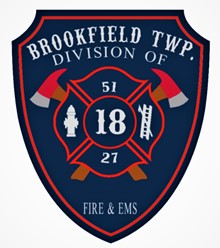Gerard Zarella has watched as the Brookfield Fire Department transitioned from an all-volunteer force, to a hybrid staff of volunteer and paid people, and now to where it’s almost all paid staff.
The transition has been bumpy at times, no more so than now as the department struggles to sufficiently staff shifts, but Zarella believes the department will come through this bump as it has the others.
“I think there’s a future for it,” Zarella said.
October marks the department’s 75th anniversary.
Fire Chief David Masirovits called the anniversary a “momentous occasion,” but said there are no activities planned to mark the event.
“I just don’t feel that we are at a point in our progression where we can pause and plan events, especially with all we have currently in the works in regards to change,” the chief said.
As a girl, Raella Baker remembers when a fire telephone was installed in her house – her dad was Hays Montgomery, a charter member of the department – and she or other members of her family would race to the fire station a short distance away to sound the alarm of a fire.
Firefighting was Montgomery’s life, said Baker, who has been with the department’s ladies auxiliary for 57 years.
“He just loved it,” she said. “It was something important that he thought he should do.”
When Montgomery, who died in 2003 at age 78, became too ill to fight fires, “He felt bad he couldn’t do it anymore,” Baker said.
“I’ve been around the fire department so long, it’s just a heritage in my family,” Baker said, noting her brother, nephew and husband, Ralph, all served the department. “It’s so important to the community.”
Gerard Zarella joined the department in 1974, and was part of the transition to a paid staff. Jack Powell had been named the first full-time chief, and Nick Bartolin the first full-time firefighter.
Zarella and others joined the department as teen-agers, sometimes riding their bikes to the firehouse to respond to a call, and running from their high school classrooms to a waiting Engine No. 1 – a 1949 International pumper – to leave school to fight daytime fires.
“When we started in the fire service, we still had shared turnout gear, the old-style roll-up Yankee boots, rubber coated canvas coats that hung along the wall of the truck bay, and molded polycarbonate helmets that would literally melt around your ears if you got too close to the fire,” Zarella said at the funeral for former Chief Keith Barrett. “If you were lucky, when you got to the station to catch the next truck out, you could actually find a set of gear that fit properly.”
 Zarella was hired as a full-time firefighter in about 1981 and was named assistant chief. In subsequent years, the department moved from its Grove Street station to Route 7, started an emergency medical service and opened a second station, Station 51 on Addison Road in Masury. Training rules became more stringent, costly and time-demanding, and volunteers started to fall away.
Zarella was hired as a full-time firefighter in about 1981 and was named assistant chief. In subsequent years, the department moved from its Grove Street station to Route 7, started an emergency medical service and opened a second station, Station 51 on Addison Road in Masury. Training rules became more stringent, costly and time-demanding, and volunteers started to fall away.
Zarella left the department in the early ’90s, and some of the biggest changes have come since then, he said.
“It’s come a long way,” he said.
Masirovits is tasked with staffing the department without much volunteer support, but at a time when fewer men and women are entering the fire service and the competition for those who do is fierce. Station 51 is closed more often than it is open due to a lack of manpower.
“That is a concern,” Zarella said of staffing issues. “I hope the township can do something to attract and keep good people here.”
Still, Masirovits has done a good job in maintaining a high quality of service and relationships at the county level and with neighboring departments on both sides of the state line as mutual aid has become more important, Zarella said. He also said Masirovits has met the challenges of training and equipment.
“It’s gonna be there,” Zarella said of the department. “We need a fire service. I don’t see us losing our fire service.”
The department is driven by the same goals of the charter members: to serve the community, mitigate emergencies and do no “additional unnecessary harm,” Masirovits said.
“We remain steadfast in our duties to those we protect by performing daily with integrity, compassion, empathy and competence,” he said. “We are driven by a passion to help save the lives of our fellow man and serve them without regard to ourselves when they call upon us.”








